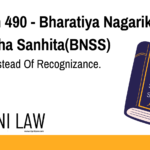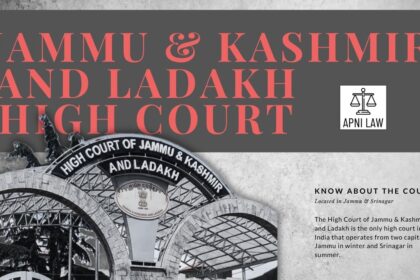Code: Section 495 BNSS
All orders passed under section 491 shall be appealable,—
(i) in the case of an order made by a Magistrate, to the Sessions Judge;
(ii) in the case of an order made by a Court of Session, to the Court to which an
appeal lies from an order made by such Court.
Explanation of Section 495 BNSS
Section 495 of the Bharatiya Nagarik Suraksha Sanhita (BNSS) deals with the appeal process for orders passed under Section 491. It outlines how individuals can challenge these orders in higher courts, ensuring that they have a fair opportunity to seek justice.
Key Points:
- Appeal from Magistrate’s Orders:
If a Magistrate issues an order under Section 491, a person can appeal it to the Sessions Judge. The Sessions Judge will review whether the order was correct and fair. - Appeal from Court of Session’s Orders:
If the order is made by a Court of Session, the appeal should be filed with the appropriate higher court. This is typically the High Court, depending on jurisdiction. - Purpose of the Appeal Process:
This section ensures that decisions made under Section 491 are not final. A higher court will assess whether the decision was made justly, providing a safeguard against wrongful or unfair rulings.
Illustration
Example 1: Appeal Against Magistrate’s Order
Scenario: A Magistrate passes an order under Section 491. The party affected by this order feels it was unjust.
What Happens: The party can file an appeal with the Sessions Judge to have the decision reviewed.
Example 2: Appeal Against Court of Session’s Order
Scenario: A Court of Session issues an order under Section 491, and the aggrieved party seeks to challenge it.
What Happens: The party can appeal to the appropriate higher court—typically the High Court—to review the legality and fairness of the decision.
Common Questions and Answers on Section 495 BNSS
1. Can an order passed under Section 491 be appealed?
- Answer: Yes, all orders under Section 491 are appealable. If the order is made by a Magistrate, it can be appealed to the Sessions Judge. If made by a Court of Session, it can be appealed to a higher court, like the High Court.
2. Who can appeal an order under Section 491?
- Answer: Any party who disagrees with the order passed under Section 491 has the right to file an appeal. This could be the accused, the prosecution, or any other affected individual.
3. What happens if a Magistrate makes an order under Section 491?
- Answer: If a Magistrate passes an order under Section 491, it can be appealed to the Sessions Judge for review.
4. How does the appeal process work for orders made by a Court of Session?
- Answer: When a Court of Session passes an order under Section 491, the aggrieved party can file an appeal to the appropriate higher court, often the High Court.
5. Why is it important to have an appeal process under Section 495?
- Answer: The appeal process ensures that any order under Section 491 can be reviewed. This allows higher courts to correct any mistakes and ensures that justice is upheld.
Conclusion
Section 495 BNSS guarantees that orders passed under Section 491 can be reviewed. Whether the decision was made by a Magistrate or a Court of Session, the affected parties can appeal to higher courts to seek justice. This provides a vital safeguard in the legal system, ensuring fairness and accuracy in all proceedings.








